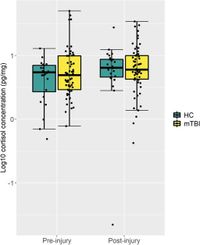In a groundbreaking study assessing mild traumatic brain injury (mTBI), researchers from the University Medical Center Groningen investigated the role of hair cortisol concentrations as potential indicators of stress connected to these injuries. The accumulating evidence suggests that although cortisol—a hormone released in response to stress—does increase in hair samples taken from mTBI patients, it may not offer reliable insights into long-term recovery or post-traumatic symptoms (PTS).
Researchers collected hair samples from 61 patients diagnosed with mTBI and 24 healthy controls (HC) within 4–6 weeks post-injury. The samples were divided to allow for comparisons of cortisol levels between segments corresponding to pre- and post-injury periods. Using advanced techniques such as liquid chromatography-tandem mass spectrometry (LC-MS/MS), the scholars quantified cortisol concentrations and aimed to establish potential correlations with psychological outcomes.
Results revealed a notable increase in hair cortisol over time for both mTBI patients and the healthy controls, suggesting a general elevation of stress responses. However, the authors emphasized that these increases were observed across both groups and did not correlate with significant differences in ongoing psychological symptoms or recovery rates. "Our findings do not support the current use of hair cortisol as a potential marker of stress in mTBI," stated the authors of the article.
The study built upon prior work that indicated a complex relationship between cortisol levels and mTBI recovery, particularly emphasizing personality traits such as neuroticism, which can influence coping mechanisms. The researchers noted, "There was no significant main effect of group, and no significant group × time interaction," illustrating the nuanced effects of stress and recovery that cortisol levels might not adequately capture.
The research, part of the AIM-TBI study conducted from January 2020 to January 2022, followed a stringent methodology, ensuring collection and analysis adhered to ethical guidelines. Participants underwent thorough assessments that measured various factors contributing to PTS, anxiety, depression, and personality characteristics, yet the data indicated no significant predictive value of cortisol levels for long-term outcomes.
An important aspect highlighted was the study's focus on the effects of mTBI on cortisol levels. Despite finding hormonal increases, the context of these findings created questions about the effectiveness of hair cortisol as a stress biomarker. With sample sizes suggesting the possibility of washout effects and variabilities in hair treatment and stressor exposure, the authors recognized crucial limitations in the methodology. They advocated for more extensive studies tapping into varied injury severities and confounding factors surrounding mTBI.
Ultimately, the team's evidence prompts a reevaluation of the conventional wisdom regarding cortisol metrics in stress and recovery contexts. Future investigations need to address broader and more severe injury populations while considering alternative biological markers, especially as current findings cast doubt on the efficacy of using hair cortisol concentrations as definitive indicators of psychological stress.
This research serves as a reminder of the intricacies involved in chronic stress analysis within traumatic brain injuries. As how we understand stress evolves, so too must our methods of measuring it, ensuring that health practitioners have reliable tools to aid recovery trajectories for mTBI patients.




